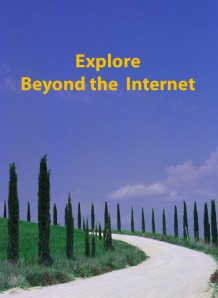
This is Week 32 in my Beyond the Internet series in which I explore the sources of information beyond our computer screens and the topic is Journals. This is part of the Archives and Libraries section of the series and follows on from the discussion of university and reference libraries in Week 29 and books in Week 30. Please do join in and write comments or posts on your experiences with these.
What Journals?
My main focus here is the academic journals published by various academic societies. These include short articles written by academic experts in a particular field. In most cases, their articles will only be published if they pass a process of peer-review. This involves the journal editors seeking an assessment by other academics with similar expertise to ascertain the rigour of the research and the merits of the argument. Once published, the article will be subject to sometimes vigorous critiquing by their world-wide peers. In short, this is cutting-edge information in any particular field.
What’s it got to do with Family History?
Well as we advance further into our family history we usually decide we want to know more about the general regional and world influences on their lives. We also want to know whether our families’ experiences fit a norm eg was their migration experience typical. This is where academic journals can be of great help. Yes, you can also learn much from published books, academic or more general, but remember journals represent research almost as it’s happening whereas books do take time to publish. Like theses, journal articles may never make it into book form (though the pressure on academics to publish does increase the chances).
In my own reference library I have innumerable copies of articles on migration with a focus on Irish migration. What about articles on how typical Scottish illegitimacy was in the time your great-grandmother had her illegitimate child? No, they’re not “sexy” and sometimes they can be hard work, but you may be surprised by how readable these articles can be, especially those written by historians.
I also use Economics journals as reference sources because so much of life is affected by financial considerations and the state of the economy.
Where do you find them?

Based on what I’ve already said, it’s reasonably obvious that the first place to look is in a university library near you. This worked well when all journals were received in paper form as you could just go and take them off the shelves to review, having first trawled the library catalogue for relevant articles. However many are now being published in electronic form. This makes it challenging as you usually can’t read them, even in situ, without some form of university library card.
Nevertheless help is at hand for all of us without valid access to university journals. Assuming you have already got your library card from the National Library of Australia, you can access many of the same journals through the NLA’s electronic resources. Once you’ve logged in using your card number and name, you’ll see an alphabet option across the top. Click on J and choose JSTOR. This is your gateway to those same journal articles. You will soon have a long list of topics to choose from. Let your inner researcher loose and have fun exploring! One that’s just caught my eye is Archivum Hibernicum. I can feel a detour coming on.
Overseas researchers probably have access via a similar facility. I’d suggest checking with your national library or a key reference library.
Other journals
On a more prosaic note, there are other journals we can profitably use. They are the journals published by the various family or local history societies. I’m probably as guilty as many others of not paying enough attention to these. The content of each journal is quite variable and it’s worth searching widely as a story relevant to your region of interest may be published in a society journal far from that region.
For example in the Toowoomba and Darling Downs FHS journal, there has been a series on London churches and another on some early properties on the Downs which are of interest to me. Ances-tree, the journal of the Burwood & District FHS, has a superb series on German migration, mainly written by Jenny Paterson. These go back over many years so do trawl back through them if you have an interest in this topic.
Other journals which are useful to family historians are those published by the state and national historical societies. These also contain informative and reliable articles by eminent historical researchers. Your regional reference library is likely to have a copy so keep an eye out when you visit.
I hope I’ve managed to convince you that journals can be far from boring. They can really give you an historical and economic structure on which you can hang your family’s story and make it all the richer.
I agree–journals (as well as academic books) are a really useful resource when doing family history.
LikeLike
I suspect they’re an under-utilised resource, Sheryl, but hopefully people will give them a try. I imagine you’ve used them a lot doing Grandma’s journal.
LikeLike
I do. I am very fortunate to have easy access to a really good library.
LikeLike
I have enjoyed reading articles from scholarly journals in the past. A few years ago when I was taking some university classes I had access to several resources. Now it looks like I’d probably have to pay for the privilege, though I have not really researched what is available through the libraries.
Lee
Wrote By Rote
LikeLike
You’re right Lee, they’re often available only with student/academic library cards though some university libraries here do offer community access on a limited, pay-to-use, option. You may find one of your major reference libraries offer something similar to our NLA access.
LikeLike